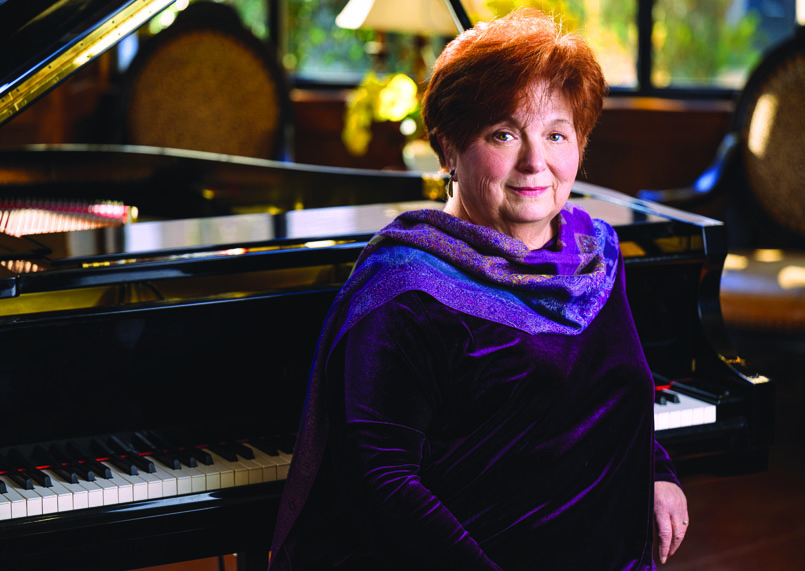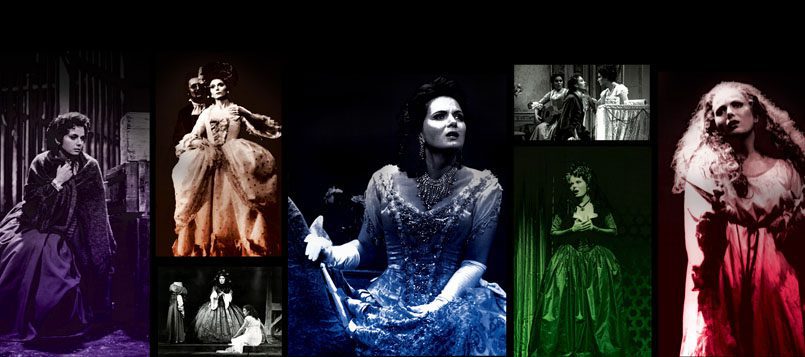28 Feb 2022 Celebrating Artistic Excellence: Christine Donahue
By Jade Fitch
Christine Donahue’s passion for singing started at an incredibly young age. “I sang my first solo when I was in kindergarten, at my hometown May Day program, in front of hundreds, maybe thousands of onlookers. It never phased me,” she said.
Donahue loved to sing because it’s something that always came naturally to her. And her first kindergarten solo performance was the first of many future performances.
Donahue said when she was little, she loved dressing up in costumes. “I frequently joke that I went into opera because of the costumes,” she said. “I’m not sure that was really a joke! I love the role-playing, pretending, digging into the character, and examining the situations that prompted certain responses from my character.”

Donahue attended Julliard, the world leader in performing arts education, for her graduate studies. And in 1976, while there, she performed her first opera: “ll Matrimonio Segreto” (The Secret Marriage) by Domenico Cimarosa. She also sang Alice Ford in Verdi’s “Falstaff” with the American Opera Center, which is also part of Julliard.
Not only did she perform at Julliard, but she also graced the stage at the Metropolitan Opera House in New York while in graduate school. Donahue competed and was chosen to sing two arias in the finals of the Metropolitan Opera National Council Auditions.
Donahue started her opera profession with The Houston Opera Studio. She also spent part of that apprenticeship touring with Texas Opera Theater. It was in these performances that she really learned her craft.
But her first job in Youngstown, Ohio, got her into the real world. To advance her opera career, she got a manager and landed auditions with regional companies, which helped her move forward in her career. In Little Rock, she found a home company that helped sustain her singing career. “Dr. Ann Chotard started the company and regularly hired me. She was very influential in my life, as well as my profession.”
Donahue has had many special moments in her opera career, but the most memorable was opening night of “Lucia di Lammermoor” with Lake George Opera. “The applause following my first aria was unlike anything I had experienced before or since.” It was at that moment that Donahue knew she had talent, and she was doing what she was meant to do.
It’s well-known that the art of singing can have an emotional impact on those listening. Donahue said what she loves most about singing is reaching everyone in the audience. “Egotistically, I love the feeling of power I have sending my voice out over the orchestra in a 2,000 seat theater and knowing somehow I’m making an impact on someone in the top row. Also, I love the idea that I may be affecting someone emotionally out in the audience.”
Singing is also an expressive form of communication. “We have words, [and] we’re expressing emotions that all of us feel, but many of those people in the theater don’t have the ability to be that vulnerable in front of others,” she said. “We sort of vicariously do that for them. We pull them into our little world for an evening and allow them to feel and respond in a way they may not allow themselves to do in their world.”

Along with performing opera, Donahue also performed at the Arkansas Repertory Theatre. It was a single performance of “Souvenir: A Fantasia on the Life of Florence Foster Jenkins” that was presented as a fundraiser. What’s interesting about this performance is the way she landed her role—it was all in the connections she had. “Florence Foster Jenkins and I grew up in the same town, practically, Wilkes-Barre, Pennsylvania. A colleague of mine, Dr. Timothy Smith, asked me to look at the play, not knowing I had this connection with her.” Donahue felt like she had been given a gift. “It wasn’t a matter of whether I was interested in performing the play; I had to do it.”
Donahue started performing opera in 1976, and her last opera performance was in 2019. That’s 43 years performing, with a few gaps in between; however, you will not find Donahue performing today. “I’m getting older, my instrument is getting older, and it doesn’t respond the way I’d like it to respond,” she said. “I remember too well what I used to be able to do with my voice; it’s not as satisfying now.”
Teaching is also a part of Donahue’s life. What’s interesting is she didn’t decide she wanted to teach, rather it kind of fell in her lap. “I got a call from the University of Central Arkansas saying they were in need of an adjunct voice teacher,” she said. “One day a week became two days, then three days a week.”
At UCA she taught voice lessons, diction (Italian, French, and German) and vocal song literature. After six years of adjunct teaching, a full-time tenured professor position became available. She spent the next 15 years as an associate professor of voice at UCA.
Despite her retirement last May, Donahue has continued to teach once a week at the university; however, she plans to be done at the end of this semester. At that time, she will have taught a total of 22 years. “The main things I love about teaching are the ‘Aha’ moments when the student gets the idea I’m trying to convey, as well as hearing the improvement in their voices from year to year.”
From singing and performing, to dressing up in elaborate costumes, the opera provided Donahue with memories that will forever be with her. “Through my singing and music, I’ve had the opportunity to travel the world (China twice!), meet interesting people, and enjoy lots of different experiences, cultures, and adventures. It’s been grand,” Donahue said.








